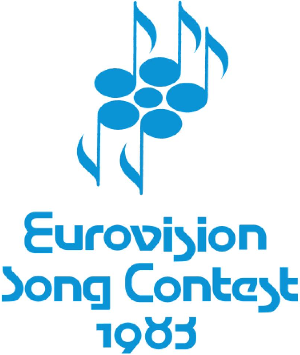1983 Eurovision Song Contest
| Eurovision Song Contest 1983 | |
|---|---|
 |
|
| Dates | |
| Final | 23 April 1983 |
| Host | |
| Venue |
Rudi-Sedlmayer-Halle, Munich, West Germany |
| Presenter(s) | Marlene Charell |
| Conductor | Dieter Reith |
| Directed by | Rainer Bertram |
| Executive supervisor | Frank Naef |
| Host broadcaster | Arbeitsgemeinschaft Rundfunkanstalten Deutschland (ARD) |
| Opening act | Marlene Charell introducing each act and calling all of them on stage together. |
| Interval act | Marlene Charell |
| Participants | |
| Number of entries | 20 |
| Debuting countries | None |
| Returning countries |
|
| Withdrawing countries |
|
| Vote | |
| Voting system | Each country awarded 12, 10, 8-1 point(s) to their 10 favourite songs |
| Nul points |
|
| Winning song |
"Si la vie est cadeau" |
The Eurovision Song Contest 1983 was the 28th edition of the annual Eurovision Song Contest. It was held in Munich, then West Germany, on 23 April 1983. The presenter was Marlene Charell. Corinne Hermes was the winner of this Eurovision with the song, "Si la vie est cadeau". This was Luxembourg's fifth victory in the contest which equalled the record set by France in 1977. It was also the second year in a row where the winning entry was performed last on the night and the second year in a row in which Israel won 2nd place.
The set that year was a quite small, arc-shaped stage surrounding the orchestra section, and a large background resembling giant electric heaters, which lit up in different sequences and combinations depending on the nature and rhythm of the songs. The 1983 contest was the first to be televised in Australia, via Channel 0/28 (now SBS Television) in Sydney and Melbourne. The contest went to become a very popular show in Australia, leading to an intended one-off participation in the 60th anniversary contest in 2015, and their invitation to return to the 2016 contest. Ireland was not in the contest because RTÉ was in strike action at that time.
Toward the end of the voting, it became evident that Luxembourg was going to win, but early on, Germany, Sweden, and Yugoslavia all threatened to take Luxembourg's lead, which they earned halfway through the jury vote. At one point, murmurs and boos arose from the crowd at the Greek jury's decision to give host country Germany only one point. This was the only occasion in which Greece didn't award any point to Cyprus.
Due to Charell's choice to announce points in three languages instead of two, the voting went on for nearly an hour, stretching the Eurovision contest past three hours for the first time ever. In addition, Charell made 13 language mistakes throughout the voting, some as innocuous as mixing up the words for "points" between the three languages, some as major as nearly awarding points to "Schweden" (Sweden) that were meant for "Schweiz" (Switzerland).
...
Wikipedia


